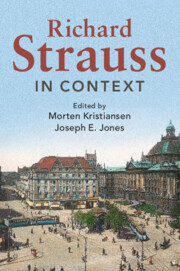Book contents
- Richard Strauss in Context
- Composers in Context
- Richard Strauss in Context
- Copyright page
- Contents
- Figures
- Notes on Contributors
- Preface
- Note on Translation
- Part I Family, Friends, and Collaborators
- Part II Career Stations
- Part III Cultural Engagement and Musical Life
- Part IV Professional and Musical Contexts
- Part V In History
- Part VI Artifacts and Legacy
- Chapter 31 Publishers and Editions
- Chapter 32 Letters
- Chapter 33 In Performance
- Chapter 34 Influence
- Chapter 35 2001: A Space Odyssey and Beyond
- Chapter 36 Scholarly Directions
- Further Reading
- Appendix: Letters Bibliography
- Index
- References
Chapter 36 - Scholarly Directions
from Part VI - Artifacts and Legacy
Published online by Cambridge University Press: 08 October 2020
- Richard Strauss in Context
- Composers in Context
- Richard Strauss in Context
- Copyright page
- Contents
- Figures
- Notes on Contributors
- Preface
- Note on Translation
- Part I Family, Friends, and Collaborators
- Part II Career Stations
- Part III Cultural Engagement and Musical Life
- Part IV Professional and Musical Contexts
- Part V In History
- Part VI Artifacts and Legacy
- Chapter 31 Publishers and Editions
- Chapter 32 Letters
- Chapter 33 In Performance
- Chapter 34 Influence
- Chapter 35 2001: A Space Odyssey and Beyond
- Chapter 36 Scholarly Directions
- Further Reading
- Appendix: Letters Bibliography
- Index
- References
Summary
A survey of dissertations on Strauss reveals trends that emerged over time in terms of topics and methodologies that captured the interest of emerging scholars as well as the geographic locations and eras that produced the most research. Yet Strauss scholarship is not merely defined by the issues it addresses and questions it puts forward, but also by those it ignores or unwittingly pushes to the margins of discussion. After assessing the past, this chapter proposes topics and approaches largely absent in existing Strauss scholarship, many of which have been more thoroughly explored in related fields. While far from comprehensive, this discussion points to potentially fruitful paths for future research: the Lieder, his influence on contemporaries, his role as Kapellmeister and administrator, his material possessions, and his relationships with figures trusted to construct his legacy.
Information
- Type
- Chapter
- Information
- Richard Strauss in Context , pp. 329 - 340Publisher: Cambridge University PressPrint publication year: 2020
